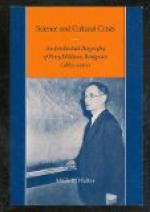|
This section contains 965 words (approx. 4 pages at 300 words per page) |

|
World of Scientific Discovery on Percy Williams Bridgman
Percy Williams Bridgman was an experimental physicist whose principal focus was on developing apparatus for producing high pressures and on measuring the effects of high pressures on materials. His work in high-pressure physics won him the Nobel Prize in 1946. His work on the electrical and thermal conductivity of metals became important to industrial metallurgists and had implications for such diverse fields as solid-state physics, geophysics, and cosmology.
Percy Bridgman was born on April 21, 1882, in Cambridge, Massachusetts. His father, Raymond Landon Bridgman, was a writer and journalist as well as a devout Protestant. His mother was Mary Ann Maria Williams. Both came from established New England families. Bridgman entered Harvard in 1900. He graduated in 1904 and remained at Harvard to earn his M.A. in 1905 and his Ph.D. in 1908. He joined the Harvard physics department as a research fellow in 1908 and became an instructor in 1910, a full professor in...
|
This section contains 965 words (approx. 4 pages at 300 words per page) |

|


